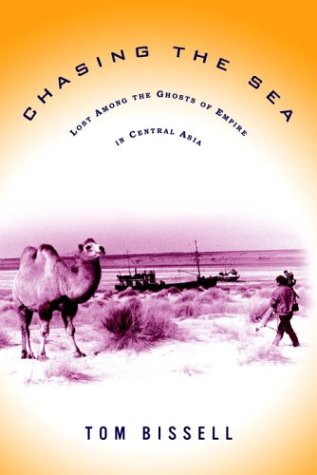
Uzbekistan RPCV Tom Bissell writes on the Aral Sea
MAN'S ABUSE DOOMS ARAL SEA
Nov 16, 2003 - Richmond Times-Dispatch
Author(s): Reviewed By J. Lane Goodall
CHASING THE SEA, by Tom Bissell; Pantheon, $24.95.
In 2001, five years after the author ended his hitch in the Peace Corps with an "early termination of service," he was back in Uzbekistan. Commissioned to write a magazine piece on the Aral Sea, he would come to realize that his task involved more than writing an epitaph for a doomed body of water. It was to "find and reassemble a mislaid, broken part of himself."
Although Tom Bissell claims not to be a scholar, he displays an impressive knowledge of the history of the region as he recounts his travels through Tashkent, Bukhara, and Samarkand. Of particular note are his reflections on cultural and ethnic divisions, as well as the consequences of the Soviet Union's decision to impose artificial boundaries and alien law on what had been "an ill-defined outback of clannic enclaves."
IN 1991, Uzbekistan declared its independence. When Bissell asked his translator if he wished it were still part of the Soviet Union, he replied, "Very complicated question, dude. Very complicated. In some ways, no. In some ways, yes. Most ways, no. But when we were the Soviet Union, we were strong and un- afraid and we knew the world looked to us, you know? Who looks to Uzbekistan?"
All of which brings us to the Aral Sea, however indirectly. When the author asked a geographer who works for Medicins Sans Frontires (its members do not like to be called Doctors Without Borders) why the ecological horrors of the region have drawn so much attention and so little action from the West, he attributed it to the "Where- the-hell-istan phenomenon." People simply do not know where to look to direct their outrage.
As recently as 1960, the Aral Sea was the fourth-largest inland body of water in the world. Now that decades of irrigation have depleted the rivers feeding into it, it is drying up, and what remains is hopelessly polluted by fertilizers and herbicides. Moynaq, which used to be a thriving port city, is now 70 miles from the water's edge. As the sea receded, fishermen desperate to continue their way of life dug canals. "Chasing the sea," they called it, but by 1986 all the fish were dead.
THE LAST chapter is a masterpiece of desolation. The author toured a hospital filled with patients suffering from ailments linked to the dying ecosystem, he walked on the dry soil once covered with water, and he marveled at ships left in the sand as the sea retreated. The scene was so horrific that it tended to numb its own effect. He could not decide if the rusting hulks served as potent symbols or as local scrap.
Some experts predict that the Aral Sea will be gone by 2015, and some of the area's inhabitants will not last that long. The outrageous fortune of this troubled sea may be "the ugly truth that human progress inevitably comes at the price of condemning obscure pockets of the world to unimaginable suffering."
The author's first tour in Uzbekistan lasted seven unhappy months. Whether the six weeks described in this book restored "the broken part of himself " to which he alludes, only he knows for sure. What is sure, however, is that he provides a brilliantly written and incisive commentary on the present state of that country.
